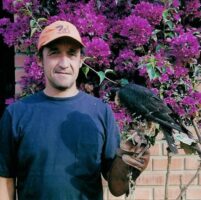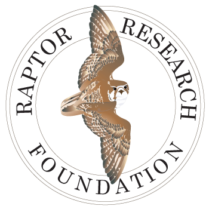Oscar Beingolea Research Grant
OSCAR BEINGOLEA RAPTOR RESEARCH GRANT
THE AWARD: The Oscar Beingolea Raptor Research Grant provides financial support for field research on raptors in Latin America (including the Guianas) and the Caribbean. We especially encourage projects that bring attention to poorly known species, systems, or questions, and those that include a conservation and/or community engagement component. Priority will be given to proposals from Latin American and/or Caribbean nationals or residents with limited access to other funding. Applications that do not focus on raptors in Latin America or the Caribbean will not be considered.

ABOUT OSCAR BEINGOLEA: This grant was created in 2020 in honor of Oscar Beingolea (1959-2019), who devoted his life to the study of raptors in his native Peru as well as Ecuador, Mexico, Panama, the US, and throughout the Americas. Oscar’s fascination with birds of prey began with falconry, including working as a professional falconer for Fundación Ara in Mexico, and he pioneered the use of the Bicolored Hawk in falconry in Peru. A mentor to many raptor enthusiasts, Oscar nurtured a lifelong passion for Peregrine Falcons and also developed expertise on species including Orange-breasted Falcons, Bicolored Hawks, Tiny Hawks, Grey-bellied Hawks, and Harris’ Hawks. Oscar’s keen interest in raptor breeding biology led him to locate and monitor active nests of Peregrine Falcons and Orange-breasted Falcons in Peru, including the first breeding peregrines recorded in Lima. Oscar also served as a consultant for the Huayco Raptor Breeding Facility in Lima, where he helped breed Bicolored Hawk, Tiny Hawk, Aplomado Falcon, Bat Falcon, Peregrine Falcon and Ornate Hawk-Eagle. He worked with The Peregrine Fund in Panama and advised the Falcon Research Group’s Southern Cross Peregrine Project in Chile. His decades of field research on Peregrine Falcons in Peru informed numerous publications on both their breeding biology and migration, including linking wintering peregrines in Peru with their North American natal and breeding grounds. His raptor conservation work also called attention to the illegal trapping of Peregrine Falcons in Peru for use in pest control. The grant bearing his name will assist others in continuing his legacy of original inquiry, dedicated field research, and enduring commitment to asking and answering questions about raptor ecology and evolution.
AMOUNT: up to $4,000 plus waived page charges. The waived page charges allow the recipient to publish their research in the Journal of Raptor Research. The recipient must be the primary author and the paper must reflect what the award was for.
Number of grants Issued per Year: Possibly several, limited to a total of $4,000.
TO APPLY: Applicants should submit the documents listed below. Applications should be submitted in English. Although translation or editorial assistance may be available (depending on the applicant’s native language) to applicants whose first language is not English, the review of applications will be evaluated based on their scientific merit and not grammar or syntax.
• A cover letter highlighting the motivations, objectives, and expected outcomes of the study
• The applicant’s CV
• A proposal of no more than five pages, including:
o Background and justification (need)
o Study objectives and methods
o A budget detailing how funds will be spent
A list of other funding sources, both requested and received.
o Expected results
o Literature cited (maximum one page)
• A photograph of the applicant, preferably in the field, to be used when awards are announced.
Deadline: June 30
Application Method: Apply online through June 30th. Please contact awards@raptorresearchfoundation.org with questions about your application. The online application opens in January each year.
Oscar Beingolea Raptor Research Grant
| Year | Recipient | Title |
|---|---|---|
| 2024 | Estefania Parra Ochoa | |
| 2023 | Alan Monroy-Ojeda | Field Validation of Species Distribution Models and community-based field monitoring for the conservation of the Harpy Eagle and King Vulture in Mexico. |
| 2023 | Diego Garcia Gallego | Reproductive biology, survival, and dispersal of Turkey Vulture (Cathartes aura) and Black Vulture (Coragyps atratus) in central Argentina |
| 2023 | Carlos Alberto Ale | Implementing owls as natural controls of peridomiciliary rodents in areas with high risk of hantavirus infection: a socio-ecological approach. |
| 2022 | Mayra Natalia Parra Salazar | Community baseline for the knowledge of the populations of Spizaetus isidori and the treatment of the conflict with farmer communities in western Antioquia (Colombia). |
| 2021 | Ester Vallejo Santamaria | Colombia/raptor migration: Conserving migrating raptors in Columbia |
| 2021 | Sandra Cuadros | Peru/Andean Condors: Space-use by the Endangered Andean condor (Vultur gryphus) and human perception in the Sondondo Valley, Peru: identifying potential threats along the southern biological corridor |
| 2020 | Beatriz M. Miranzo | Identifying and characterizing potential mortality sites for birds of prey associated with the presence of water reservoirs in ecosystems in the semi-arid zone of central Argentina. Can mortality be mitigated by placing rescue ramps in water reservoirs? |
